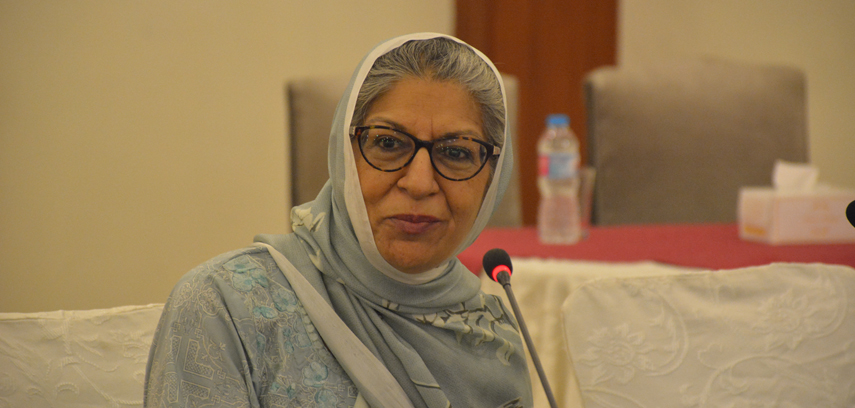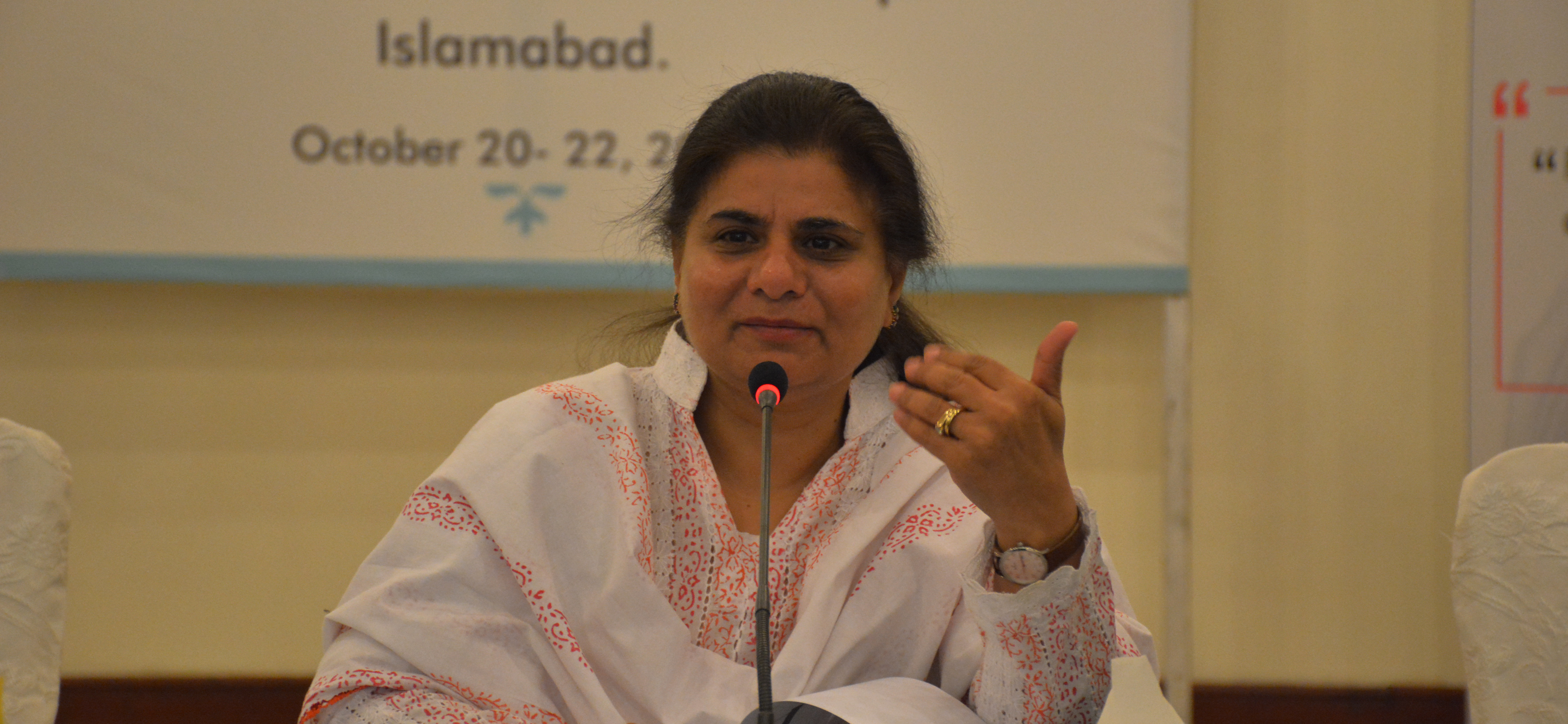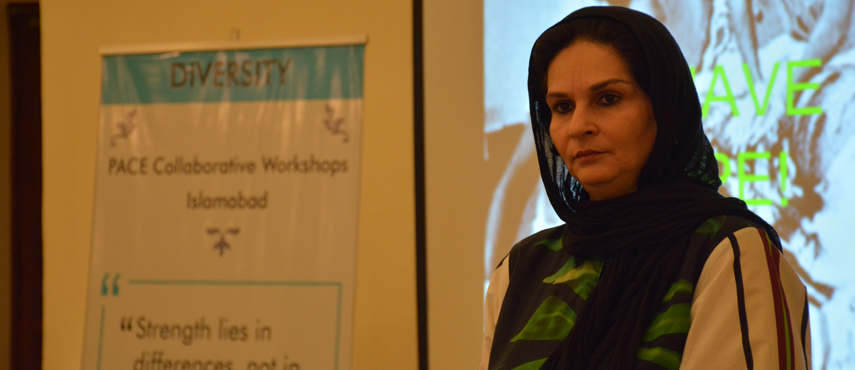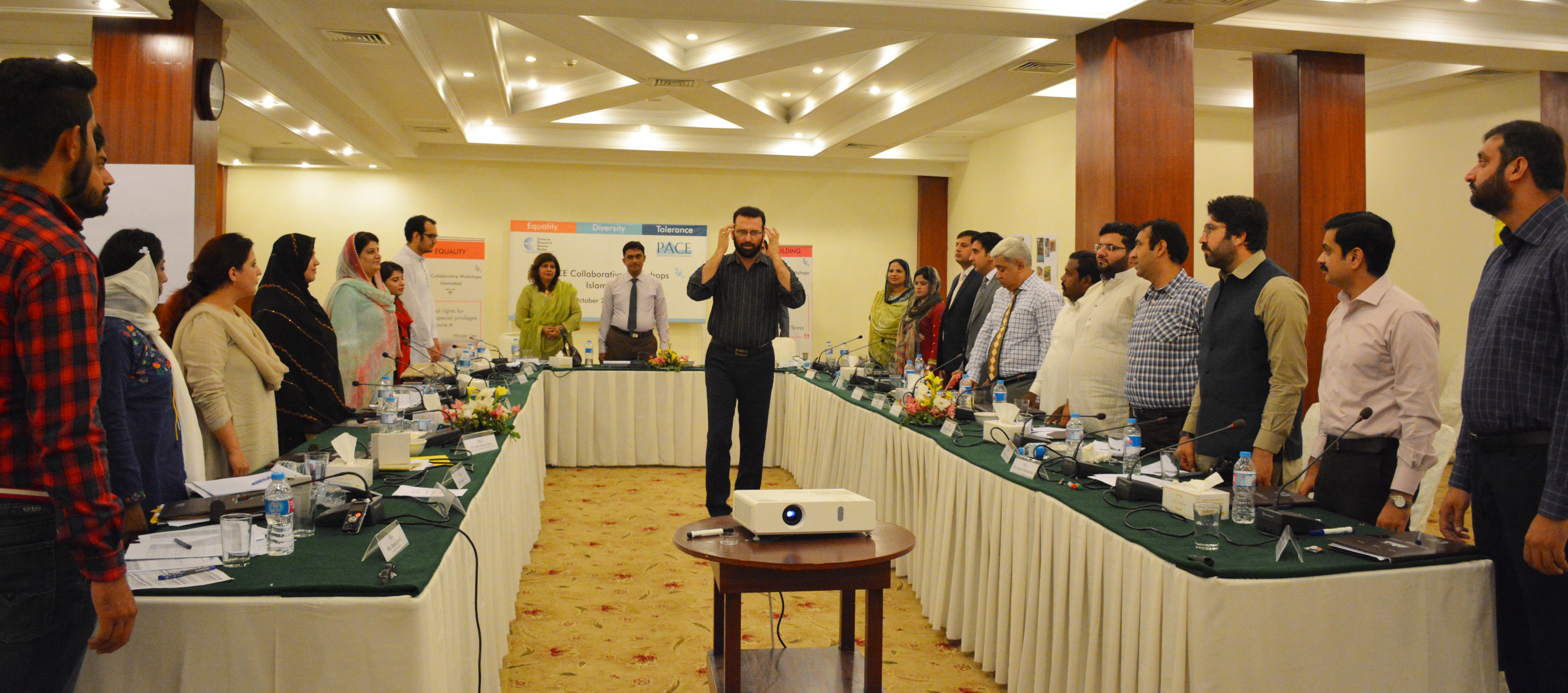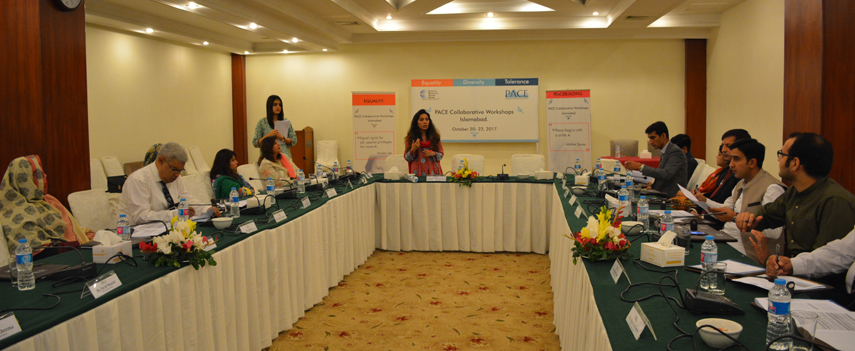The Center for Research and Security Studies (CRSS) conducted the 22nd three-day PACE Collaborative workshop for young university lecturers and professors from October 20 – 22, 2017, at Hill View Hotel, Islamabad. The workshop was conducted under the umbrella of the Pakistan Center of Excellence (PACE), a counter-radicalization, pluralistic values focused project, in collaboration with the Dutch Government. Participants included young university lecturers and professors from all across Pakistan including Sindh, Balochistan, Punjab, KP, AJK, FATA rand GB.
OPENING
AMBASSADOR FOUZIA MIAN SANA
Her Excellency, Ambassador Ms. Fouzia Mian Sanaullah was chief guest to the opening ceremony. She shared her views saying, “I’m very happy to interact with the young professors from all corners of Pakistan.” Sharing her views on multiculturalism she said, “Multiculturalism is the coexistence of diverse cultures where it includes cultural, racial and religious groups and is manifested in customary behaviors, cultural assumptions and values, pattern of thinking and communication style.” She referred to the address of Quid-e-Azam which he made to the first constituent assembly where he said, “Pakistan is for all and you are free to go to your mosques and temples and you are free to pursue your professions and be a free citizen.” She expressed that we along the line somewhere just expunged these remarks from our national discourse and it is a tragedy. We have turned to a path where the visionary leaders of Pakistan didn’t want to take. This is the root cause of all the issues we are facing in Pakistan.
“First of all, when we talk about diverse cultures we think of different countries having a totally different culture. Within Pakistan, we have such diversity of traditions and cultures that celebrating differences should be the aim in Pakistan. We lost East Pakistan because we refused to accept the majority wish to give them their language. Language is the most basic and crucial element of cultural expression. If we didn’t respect and celebrate cultural differences we are bound to lose that segment of society. This is now what happening in Pakistan. We refused to accept that we are diverse and imposed the majority culture on all. We see the celebration of cultures on national days only. I wonder why there is so much deterioration,” she said.
Customary behaviors are to use disgraceful words for people on the basis of their work, caste or religion. Our society has degenerated to a point where we longer feel the need of respecting others. We give bad names to the people and always put them in the same category and try to see them from a different perspective. Talking about cultural assumptions, Ms. Sana said that everyone thinks of their own cultural background and misunderstandings develop from this point. We don’t give space to others and not even like to tolerate the differences. We don’t bother to respect or accept other opinions. We just want to dictate our opinions on others. We don’t have the capacity to listen and absorb the new ideas and change ourselves.
SHAGUFTA KHALIQUE: FUNDAMENTAL OF DEMOCRACY, GOVERNANCE AND ACCOUNTABILITY
Ms. Shagufta Khalique kicked off the workshop’s first session on the first day and discussed the topic of ‘Fundamentals of Democracy, Governance and Accountability’. She started the discussion with the definition of democracy. She defined democracy as a system of government by the whole population or all the eligible members of a state, typically through elected representatives. It can be conceived as a political system, an ethical ideal or a social condition. It can also be referred as a state, a government, a society, an institution, or an ideal as democratic. Ms. Khalique described the types of democracy as representative, parliamentary, presidential, semi-presidential and a liberal democracy. Representative Democracy involves the selection of government officials by the people being represented. Whereas Parliamentary Democracy is a representative democracy where government is appointed by parliamentary representatives as opposed to a ‘presidential rule’ wherein the president is both head of state and the head of government and is elected by the voters. Presidential Democracy is a system where the public elects the president through free and fair elections. A semi-presidential system is a system of democracy where the government contains both a Prime Minister and a President. A Liberal Democracy is a representative democracy in which the ability of the elected representatives to exercise decision-making power is subject to the rule of law, and usually moderated by a constitution.
Ms. Shagufta also discussed the four components of democracy of the executive, legislature, judiciary and media. Also, she described the characteristics of democracy in the following points:
- Enlightened Citizen ship
- Character and Ability
- Freedom of Expression
- Organization and leadership
- Common goals
- Rule of Law
- Fundamental Human Rights
- Political Parties
SAIMA JASSAM: THE CIVILIZING HEXAGON: FRAME WORK FOR A PEACEFUL COEXISTENCE (A CASE STUDY OF PAKISTAN)
Ms. Saima Jassam kicked off her session on the topic of The Civilizing Hexagon: Frame Work for a Peaceful Coexistence (A Case Study of Pakistan). She discussed the six cornerstones of the civilizing hexagon which are monopoly of aggression, rule of law (constitutional state system, interdependence and control of emotions, democratic participation, social justice, and constructive conflict management. She stimulated the discussion on these points with saying that the legitimate state monopoly of power i.e. the safe guarding of the rule of law is of fundamental importance for any modern peace system. Only “disarming of citizens”, and the de-privatization of force, compels them to settle their identity and interest conflicts by argument and not by force. Only then are the parties to potential conflict compelled to resort to argument and hence to a policy of deliberation in the public space. Thus the de-privatization of aggression is essential for the civilizing project. There can be no lasting peace without the disarmament of citizens. When analyzing Pakistan’s situation, one sees that in its short existence since 1947, it has had 32 years of military dictatorships, (1958-71, 1977-1988, 1999-2008) and only a short period of elected Governments (1947-1958, 1971-1977, 1988-1999 and from 2008-to date), thus robbing it of the opportunity to develop institutions democratically. However, Pakistan’s political parties lack internal democracy and are dominated by strong personalities. The leadership culture in Pakistan is shaped mainly by feudal and authoritarian norms that adversely affect the prospects of democracy inside and outside the political parties. Since democracy has never been allowed to take root so it is still in its infancy in Pakistan. It is not based on the principle of “One man, one vote”, but on a client patronage system. This precarious phenomenon is enforced through power, aggression, coercion and money.
She shared her views saying that the control of state monopoly on aggression and the establishment of a constitutional state are needed to make sure that the state monopoly of aggression is not abused in a despotic way. State and an elected Government can only run efficiently if there exists a set of fundamental rights and the Rule of Law is enshrined in the Constitution of Pakistan, making it legally binding on every individual of the State. The executive, legislature and the Judiciary, are all bound and have defined roles and mandates by the Constitution. So that no one is above the law and therefore is not able to abuse their power in a despotic manner. Interdependence of the institutions and individuals helps in taming the effect control and thus is the third corner stone of peaceful coexistence. The State is able to control its emotions/aggression and transfer its anger or conflict in a civilized manner only if the political structures and different institutions of a State and society work collectively to resolve a conflict or an issue, therefore, the rule of law and monopoly of aggression is the prerequisite and an interdependent variable for the control of emotions.
Talking on democratic participation, Ms. Jassam said that where people cannot involve themselves in public affairs, whether due to legal or other discrimination, judicial unrest (S. Freud) arises, in the worst, case a buildup of conflicts, which in political societies can become a focus of violence. Democracy as the basis of institutionally regulated development of the law is therefore not a luxury but a necessary condition of peaceful conflict management. The more open and flexible the democratic rule of law institutional structure, the more resilient to stress it will be in the event of persistent or possibly increasing political demands.
HUMAIRA MASIHUDDIN: MULTI-CULTURALISM AND PLURALISM WITH REFERENCE TO ISLAM
Ms. Humaira Masihuddin kicked off first formal session of the third day speaking on the theme of ‘Pluralism and Multiculturalism’. She said that human beings belong to one origin and one place and no purely homogeneous society exists in the modern world. Most societies consist of different ethnic groups. She defined minorities as a group of people who are singled out from the other groups and are treated differently because of their physical or cultural characteristics. “Minority is a subordinate group as opposed to the dominant group. The concept of multiculturalism revolves around a society with heterogeneous beliefs and set of ideas. Multiculturalism makes a society diverse. Respect for diversity shapes coexistence, peace, and harmony under a political and institutional framework. Differences are not challenges and do not impose any limitation on growth of an individual or society. Every individual has a right to be different and be respected by all. In Islam, the concept of diversity is clearly inclusive,” she continued. In the Quran, she said, humans are addressed to treat one another without any discrimination and respect each other’s beliefs and should never use abusive language or show disrespect towards others. If we look at the character of the Holy Prophet (PBUH), it is evident how He always respected the non-Muslims in Mekkah and Medina. Even on the day Mekkah was conquered by Muslims, Prophet (PBUH) forgave all His enemies for the harms that they had inflicted on Him. Ms. Humaira also made note of the last sermon of the Holy Prophet that said “All mankind is from Adam and Eve, an Arab has no superiority over a non-Arab nor a non-Arab has any superiority over an Arab; also a white has no superiority over black nor a black has any superiority over white except by piety (taqwa) and good action”. In short, Islam is the religion of tolerance and coexistence, love and peace for others regardless of their religion or ethnicity.
SAFIULLAH GUL: MOTIVATION AND LEADERSHIP
Mr. Safiullah Gul was the last speaker of the workshop and spoke on the topic of ‘Leadership and Motivation’. He began with the saying that “he who fails to plan actually plans to fail” and shared stories of people who alone have changed the course of history, with motivation and persistence, despite all the opposition.
He said that successful leadership determines the extent of efforts directed towards a certain goal. He presented his model of goal-seeking i.e. activation, persistence and intensity. “Being alone doesn’t actually matter if you have goals and objectives set in your mind. To achieve these goals, you actually need to overcome your fears and insecurities. An individual sometimes can set an example and be motivation for others,” he shared.
The session, filled with activities to enhance creative and critical thinking, focused on looking at things from a slightly different perspective to encourage problem-solving.
CLOSING
Ms. Farhana Kanwal, Project Coordinator, PACE, in her concluding remarks, insisted that there is a dire need to revisit the widespread pre-conceived notions that have been passed through cultural values in the society over generations. Teachers, with the responsibility of imparting values to the young generation in educational institutions, are the most valuable engines that can challenge common negative narratives that promote hatred and bigotry. She said that teachers have the ability to shape an entire generation’s mindset to propagate tolerance, diversity and equality.
Ms. Zehra Zaidi, Project Coordinator, shared that participants need to conduct these activities with their students to inculcate adherence to the rule of law and equal citizenry. CRSS provides financial and logistic support in this regard to lecturers and professors so that they can foster the universal ideals of tolerance and diversity in the young generations.

